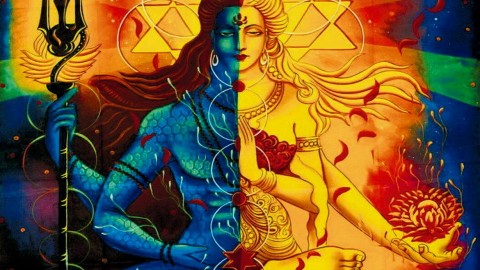First Be – In Gita Verse 3.16 My dear Arjuna, one who does not follow in human life the cycle of sacrifice thus established by the Vedas certainly leads a life full of sin. Living only for the satisfaction of the senses, such a person lives in vain.
Bhagavad Gita Verse 3.16 imparts profound wisdom through Lord Krishna’s counsel to Arjuna, emphasising the importance of adhering to the cycle of sacrifice as prescribed by the Vedas. The verse underscores the moral and spiritual ramifications of living a life disconnected from this divine order.
O Parth, the man who does not behave in accordance with the cycle of creation in this world, that sinful man enjoying the pleasures of the senses lives in vain. According to the order of creation, Krishna is highlighting the fundamental concept that life can be lived in harmony with, or in opposition to, the natural order. This principle can be understood as living in alignment with the flow of life versus swimming against it. The former approach signifies a life of simplicity and naturalness, embodying the characteristics of a religious person who harmonises with the universe. Conversely, an irreligious person, who denies the existence of God, often does so not out of true knowledge but out of a desire to rebel against the natural order. Such denial allows them to justify their resistance to the flow of life. This opposition to the divine order is a hallmark of all theories and ideologies that advocate for a struggle against the natural course of existence.
Chakra, or cycle, refers to an ordered series of events where each member of the universal wheel of action performs their duties, contributing to the smooth functioning of the cosmos. Humans, uniquely endowed with free will, have the responsibility to either uphold the harmony of this cycle or disrupt it. When society collectively adheres to its responsibilities, material prosperity and spiritual growth flourish, ushering in golden eras of human history. However, when a significant portion of humanity shirks this responsibility, chaos ensues, leading to material and spiritual decline. The wheel of nature, established by God, serves to discipline, train, and elevate beings of varying consciousness levels. Krishna explains that those who neglect their duties and succumb to sensory pleasures lead a sinful and futile existence. In contrast, those who conform to divine laws purify their hearts and attain freedom from material contamination.
Krishna’s message to Arjuna is that human life is a unique opportunity to grow in consciousness. Unlike other beings, humans possess the capacity for self-awareness and spiritual growth. Enlightened beings across various traditions have consistently emphasised the importance of this growth in consciousness.
Buddha’s interaction with a much sympathetic man vividly illustrates an essential principle. When a man approached Buddha, filled with sympathy, he asked, “What can I do to help the world?” Buddha responded with a profound insight, “You cannot do anything because you are not. How can you do anything when you are not? So don’t think of the world. Don’t think of how to serve the world, how to help others.” Buddha emphasised, “First be – and if you are, then whatsoever you do becomes a service, it becomes a prayer, it becomes compassion. Your presence is the turning point. Your being is the revolution.”
This teaching underscores a universal message echoed by all enlightened individuals: Grow in consciousness. Only human beings have the capacity to grow in consciousness. Similarly, Gurdjieff taught his disciples that meaningful action can only arise from a state of self-awareness. Without this, any attempt to act is futile.
These teachings aim to guide individuals toward self-discovery and the realisation of their true nature. The process involves shedding false notions and achieving a state of being where one’s actions are rooted in consciousness. Gurdjieff’s assertion that man has no soul, but rather the potential for one, underscores the necessity of conscious effort in spiritual growth. The soul, or the divine within, requires active cultivation through conscious effort, unlike natural growth, which occurs passively. This spiritual growth is supernatural and demands deliberate, conscious actions.
The universe provides circumstances for growth, but it is through self-consciousness that one can truly evolve. Krishna advises Arjuna that the teachings of the Vedas and scriptures are beneficial only when one engages with them from a place of self-awareness. Arjuna is urged to fight without enmity, focusing solely on the present moment without the burden of past grievances or future expectations. This principle of acting with self-consciousness is the key to spiritual growth and fulfilment for all individuals.
Tags: First Be





